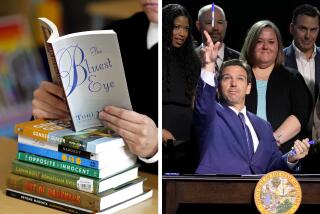Do ‘Three Cups of Tea’ readers deserve their money back?
SEATTLE -- Greg Mortenson’s “Three Cups of Tea” purports to describe the Montana philanthropist’s harrowing adventures in Pakistan that led him to launch a charity for building schools in the impoverished region. But did it really happen the way he said it did? And if not, are readers entitled to their money back?
That was the subject of a federal court hearing Wednesday in Great Falls, Mont., where Mortenson and his publishers are seeking dismissal of a lawsuit that aims to obtain class-action relief for book-buyers allegedly defrauded by purported fabrications in the book and its sequel, “Stones into Schools.”
The Montana attorney general already has completed an investigation into charges that Mortenson and the Bozeman-based Central Asia Institute he co-founded mishandled money donated to the popular charity, substantiating many of the financial allegations. Mortenson has agreed to repay his charity $1 million to resolve the financial management issues.
But the lawsuit deals with Mortenson’s inspiring accounts of his work -- and whether he deliberately concocted a scheme to paint himself as a hero to sell more books.
The case is potentially crucial for book publishers, the defendants argue, because if it succeeds -- which is by no means certain -- it could mean that publishers would be liable to defend lawsuits and reimburse readers every time a memoir turned out to have an inflated recollection of events.
The whole controversy started last year, when author Jon Krakauer and the CBS television news show”60 Minutes” came out with exposes suggesting that the adventurer-turned-school-builder embellished or even fabricated parts of his stories about getting lost after coming down from an attempt to climb Pakistan’s K2 peak, getting kidnapped by the Taliban, and launching a program to build schools for poor children in the region.
Mortenson has said his books accurately portray what happened, although some events may have been “compressed” in the interests of telling the story.
Attorneys for Penguin Group Inc., which published “Three Cups of Tea” in 2006, contend that the plaintiffs can’t argue that Penguin knew that Mortenson’s books contained falsehoods, because they were offered as autobiographies -- the implication being that nobody necessarily believes everything in autobiographies anyway.
Quoting previous case law in that regard, Penguin’s attorneys noted: “While it is possible (and perhaps even common) for autobiographies to contain intentional falsehoods, it is impossible that such intentional falsehoods can amount to fraud because nobody can justifiably rely on the contents of such a book.”
“If a publisher were required to guarantee or ensure the truth and accuracy of everything an author says, the costs of publishing books would be prohibitive,” Penguin lawyers argued in their brief seeking dismissal of the lawsuit.
In another brief, the defendants -- who also include the Central Asia Institute and Mortenson’s coauthor, David Oliver Relin -- said the courts are not the place to argue about the accuracy of memoirs.
“If the plaintiffs disagree with the books’ contents, they can debate it in their homes, their schools, their communities; write articles about it; blog about it; or tell others not to buy the books,” they said. “Plaintiffs should not be allowed to create a world where authors are exposed to the debilitating expense of class-action litigation just because someone believes a book contains inaccuracies.”
The suit was filed by several people in California and Montana, including two Montana state legislators, who said they were inspired by Mortenson’s lectures and decided to buy his book.
Only later did they learn, the plaintiffs said in their suit, that Mortenson had “hatched a scheme … to fabricate facts to make himself into a hero, while publicly stating he was heroically doing it all to help unfortunate children in Pakistan and Afghanistan.”
At a two-hour hearing Wednesday, U.S. District Judge Sam E. Haddon heard arguments on whether the suit should be dismissed and said he would render a decision later.
The Central Asia Institute has reorganized to provide greater transparency and accountability and is continuing with its school-building enterprises. It said it hoped the lawsuit would be dismissed.
“CAI’s priority is, as always, providing literacy and education, especially for girls. We remain committed to promoting peace through education and cross-cultural understanding. And we stand by Greg and his books,” the institute said in a statement. “CAI’s shared accomplishments with communities overseas are real and tangible and give us hope for the future.”
RELATED:
‘Three Cups’ author Greg Mortenson must pay $1 million to charity
Montana legislators sue ‘Three Cups’ author
Greg Mortenson responds to ’60 Minutes’
More to Read
Sign up for Essential California
The most important California stories and recommendations in your inbox every morning.
You may occasionally receive promotional content from the Los Angeles Times.










